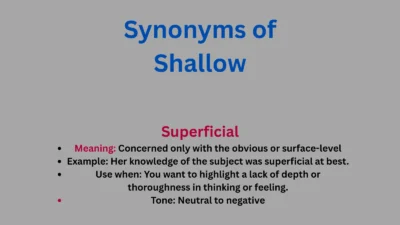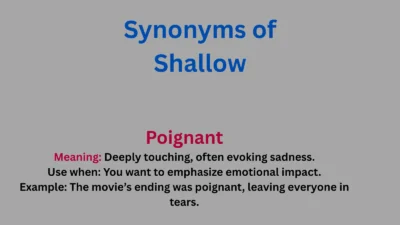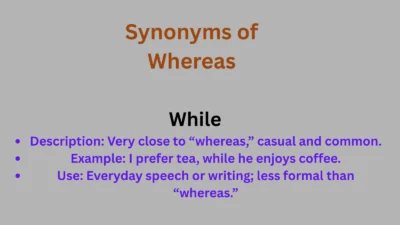Are you using the word “very” a little too often? You’re not alone. From very good to very fast, this tiny word shows up everywhere—but it often weakens your writing instead of strengthening it. If you want your language to be sharper, smarter, and more impactful, it’s time to explore better options. That’s where the synonyms of very come in.
In this guide, we’ll show you how to replace very with stronger, more specific words that pack more meaning. Whether you’re writing an essay, a blog post, or just want to sound more fluent, these synonyms of very will instantly upgrade your vocabulary.
We’ll cover simple replacements, creative alternatives, and context-based options for common phrases. You’ll also see example sentences so you can use each word with confidence. By the end, you’ll wonder how you ever settled for “very” in the first place.
What Does “Very” Mean?
At its core, very means “to a high degree” or “extremely.” It emphasizes the intensity of the adjective or adverb it modifies. It’s neutral in tone and fits just about anywhere, making it versatile but sometimes dull or repetitive.
Key nuance: very is straightforward and unpretentious. It’s neither formal nor casual, neither emotional nor cold — just a simple way to raise the stakes a bit.
Synonyms of Very Examples
1. Extremely
Meaning: To an especially high degree.
Example: She was extremely pleased with her test results.
Use: Formal or informal contexts when emphasizing something seriously or dramatically.
2. Highly
Meaning: To a great extent or degree, often used with evaluations.
Example: He is highly skilled at negotiation.
Use: Formal, often with positive assessments or qualifications.
3. Seriously
Meaning: With great importance or to a significant degree.
Example: She is seriously considering moving abroad.
Use: Casual to semi-formal, often in emotional or thoughtful situations.
4. Tremendously
Meaning: Very large or great in amount, scale, or intensity.
Example: The project was a tremendously difficult challenge.
Use: Emphasizes scale; good for dramatic effect.
5. Incredibly
Meaning: Hard to believe due to being very great or extreme.
Example: He is incredibly fast on the track.
Use: Casual and conversational, often positive surprise or admiration.
6. Utterly
Meaning: Completely or absolutely.
Example: The movie was utterly disappointing.
Use: Strong, sometimes negative emphasis, very formal or literary.
7. Profoundly
Meaning: To a deep or intense degree.
Example: She was profoundly moved by the speech.
Use: Formal, often emotional or intellectual contexts.
8. Remarkably
Meaning: To a notable or surprising degree.
Example: He recovered remarkably quickly.
Use: Positive emphasis on unexpectedness or achievement.
9. Really
Meaning: Informal, a common substitute for very.
Example: I’m really tired today.
Use: Casual everyday conversations.
10. Seriously
Meaning: To a significant or earnest degree.
Example: The situation is seriously complicated.
Use: Emphasizes importance or concern.
11. Exceedingly
Meaning: Extremely or exceptionally.
Example: The instructions were exceedingly clear.
Use: Formal or literary tone.
12. Deeply
Meaning: To a great depth or extent, often emotional.
Example: She felt deeply grateful.
Use: Emotional contexts, introspective or poetic.
13. Excessively
Meaning: Too much, more than necessary.
Example: The noise was excessively loud.
Use: Often negative, warning, or criticizing.
14. Overly
Meaning: To an excessive degree.
Example: He was overly confident in his abilities.
Use: Negative tone, critiques, or cautions.
15. Awfully
Meaning: Very (informal), sometimes with a negative or ironic tone.
Example: I’m sorry for being late.
Use: Casual, British English; can be sincere or ironic.
16. Particularly
Meaning: To a specific or notable degree.
Example: She was particularly interested in art.
Use: Emphasizes specificity or distinction.
17. Extraordinarily
Meaning: Very unusual or remarkable.
Example: The view was extraordinarily beautiful.
Use: Formal or poetic, expressing admiration.
18. Severely
Meaning: To a great and serious degree, often negative.
Example: The town was severely affected by the storm.
Use: Serious, formal contexts.
19. Tremendously
Meaning: To an enormous degree.
Example: They made a tremendously big impact.
Use: Dramatic and positive.
20. Wildly
Meaning: Extremely, often informal, and enthusiastic.
Example: The concert was wildly good.
Use: Very casual, youthful tone.
21. Massively
Meaning: Very large in amount or degree.
Example: The team was massively disappointed.
Use: Casual or conversational.
22. Hugely
Meaning: Very great in size or importance.
Example: The event was hugely successful.
Use: Informal and conversational.
23. Colossally
Meaning: To an enormous extent, often negative.
Example: He made a colossally bad mistake.
Use: Formal or humorous exaggeration.
24. Radically
Meaning: Very different or extreme.
Example: The design was radically innovative.
Use: Formal, emphasizes change or difference.
25. Markedly
Meaning: Noticeably or significantly.
Example: The temperature dropped markedly overnight.
Use: Formal or scientific contexts.
26. Intensely
Meaning: Very strong or extreme.
Example: She was intensely focused on her work.
Use: Emotional or sensory emphasis.
27. Exceptionally
Meaning: Unusually excellent or superior.
Example: He is an exceptionally talented musician.
Use: Formal praise.
28. Seriously
Meaning: To a great extent, often emphasizing sincerity.
Example: The problem is seriously urgent.
Use: Formal or informal, serious tone.
29. Overwhelmingly
Meaning: Very great in number or effect.
Example: The response was overwhelmingly positive.
Use: Formal, quantitative or emotional emphasis.
30. Immensely
Meaning: Very large or great.
Example: She was immensely proud of her achievement.
Use: Formal or emotional, positive tone.
How to Choose the Right Synonym?
- Tone Matters: For casual conversations, words like really, awfully, or wildly fit best. For formal writing, use exceedingly, profoundly, or exceptionally.
- Context Is Key: Words like excessively or overly imply too much, so use them cautiously, often to signal a negative excess.
- Emotional Color: Profoundly, deeply, and intensely work well when feelings are involved. Seriously adds weight and urgency.
- Cultural Nuances: British English often uses more casually than American English, where it’s less common.
- Specificity: Particularly and markedly help point out something distinct or noticeable rather than just “very.”
Conclusion:
While very is a trusty companion in speech and writing, using synonyms of vary thoughtfully can elevate your communication. Knowing the subtle differences helps you choose a word that fits your style, context, and audience.
Next time you want to say very, try mixing it up with alternatives that bring flavor, precision, or emotional depth to your sentences.
If you want to sound formal, casual, dramatic, or sincere, there’s a perfect synonym waiting for you.
Happy writing — and intensifying!




